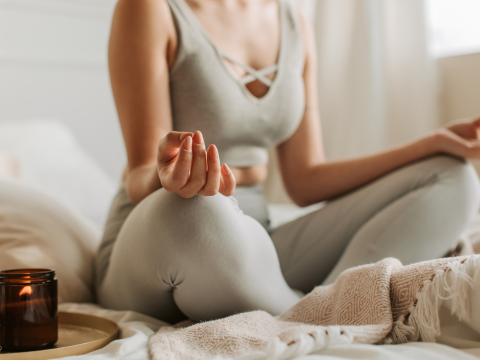The arrival of a new year is often met with a mix of anticipation and excitement, as it brings a sense of renewal, fresh opportunities, and the promise of new beginnings. Many of us set ambitious resolutions, eager to make positive changes in our lives. However, this sense of possibility can also be overwhelming, as the pressure to start fresh and improve various aspects of life can create stress and uncertainty. To help navigate these feelings and approach the new year with clarity and calm, we've gathered four science-backed tips from leading wellness experts. These strategies are designed to ground you, and promote a sense of balance and focus, allowing you to move into the new year with confidence and resilience.
1. Get outside + ground
Nature has a profound calming effect on the mind and body. Spending time outdoors reduces stress, boosts mental clarity, and improves mood. Dr. Peter Attia, a longevity expert and author of Outlive, highlights that walking in nature lowers activity in the brain’s stress response center.1 Step outside, place your bare feet on the grass or sand, take three intentional breaths, and notice the shift in your mind and body.
2. Move your body
Physical activity is one of the best ways to improve your mood and relieve stress. Research emphasized by Dr. Rhonda Patrick, a Ph.D. in biomedical science and expert on aging and healthspan, shows that just 10 minutes of vigorous exercise enhances brain function and cognitive abilities.2 For added benefits, incorporate yoga or tai chi, as Dr. Mark Hyman, a functional medicine pioneer and bestselling author, notes these practices can actively reduce stress and promote relaxation.3
3. Prioritize sleep
Sleep is essential for mental clarity and stress management. Dr. Mark Hyman advises keeping your bedroom cool, as heat disrupts restorative sleep stages like REM. Aim for 7–9 hours of quality rest by creating a calming bedtime routine, which might include diaphragmatic breathing.4 Dr. Daniel Amen, a psychiatrist and brain health expert, recommends this technique—inhale deeply for four seconds, hold for one second, and exhale for eight seconds—to activate the relaxation response and prepare your body for rest.5
4. Stay social
Building meaningful connections with loved ones is key to reducing stress. Dr. Julianne Holt-Lunstad, a professor of psychology and neuroscience at Brigham Young University, emphasizes that strong social ties can lead to longer, healthier lives. She suggests engaging in community activities or joining groups that align with your interests to foster a sense of belonging and support.6 Regular social interactions can enhance your well-being and provide a buffer against stress.





